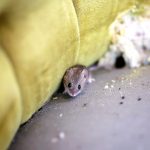
Despite their name, kissing bugs are anything but romantic. These tiny pests are notorious for leaving tiny bites on people in the middle of the night – typically around the mouth area, hence their nickname. While it’s unsettling enough to wake up covered in bites, are kissing bugs actually dangerous? In this article, the experts at Terminix Anderson answer this question and provide tips on how to keep your bedroom pest-free.
What Are Kissing Bugs?
Triatomine bugs – commonly called “kissing bugs” – are parasitic insects that feed on blood. They are oval shaped, dark in color, and typically grow to around ½ to 1 inch in length. Though juveniles do not have wings, adults do and are capable of flying. Their most defining feature, however, is a long and prominent beak that they use for feeding.
Since kissing bugs are nocturnal, they tend to hide near sleeping humans or animals. Most stay in small nooks or crannies such as cracks in floorboards, walls, or furniture. Adults are solitary and generally do not live in large groups, though females may leave eggs behind.
Are Kissing Bugs Harmful?
As with any blood-feeding insect, kissing bugs are dangerous. While their bites are not particularly painful, they could lead to infections or serious diseases. Triatomine bugs are most known for spreading Chagas disease, which could have chronic effects lasting a decade or more after the initial transmission.
What is Chagas Disease?
Chagas disease is the result of a parasite called Typanosoma cruzi, which is stored in the digestive tract of kissing bugs after they feed on an infected organism. The parasite doesn’t spread while the kissing bug is actively feeding; rather, it enters the wound of the bite through feces, which the insect typically leaves behind after feeding. According to the Centers for Disease Control (CDC), Chagas disease is potentially life-threatening. Early signs of the disease include:
- Swelling around the bite
- Fever and fatigue
- Body aches
- Swelling eyelids
- Headaches
- Loss of appetite or nausea
- Swollen glands
If you suspect you are suffering from Chagas disease or another illness, seek medical attention immediately. Other animals may also suffer from this disease, so contact your veterinarian if you believe your pet has been bitten.
How to Prevent Kissing Bugs
The last thing you want is to discover bite marks on your face first thing in the morning. Keeping triatomine bugs out of your home is the best way to prevent illness or harm from these pests. Here are some ways you can prevent kissing bugs from entering your space:
- Seal any openings around doors, windows, or your foundation
- Repair any broken screens or weather stripping
- Keep your landscaping tidy and remove debris near your house
- Place yard lights farther away from the base of your house
- Let pets sleep indoors during the nighttime
- Periodically check sleeping areas for signs of bugs
What to Do if You Find a Kissing Bug
It’s never pleasant to find a pest in your home – especially one as creepy as a kissing bug. While your initial instinct may be to squash the insect immediately, the CDC strongly recommends that you do not come into contact with the kissing bug.
Rather than squishing it, place a clear container on top of the insect and seal the bug in. Then, contact a pest control professional. An expert will be able to confirm your identification and inspect your home for signs of lingering pests.
Worried you found a kissing bug in your home? Just want to ensure your space is completely free from pests? Terminix Anderson has your back. Since 1913, we’ve built a reputation throughout Illinois and Indiana for providing exceptional pest control services. Our highly qualified technicians prioritize your health and safety, which is why we create custom solutions that focus on fast relief with long-term results. Don’t let pests take over your home – give us a call today to get a free quote!





